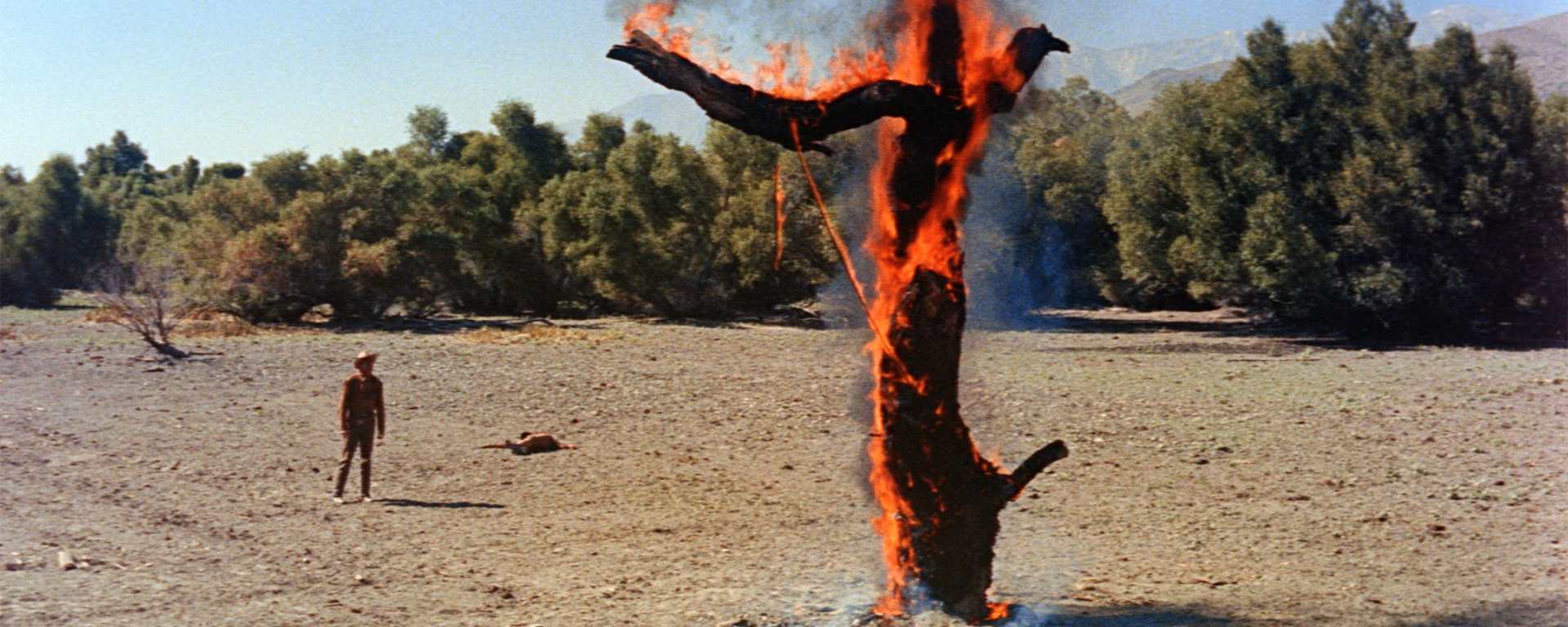There are some things a man can’t ride around.
So says Sam Boone (Pernell Roberts), a character with so many good lines he almost steals the show from the lead, Ben Brigade (Randolph Scott). That’s because Brigade is trying so hard to hold back an ocean of sadness that he just about can’t talk. When Boone mentions the beauty of Mrs. Carrie Lane (Karen Steele), a buxom blond in the middle of this harsh country and filthy men, the best Brigade can manage is, “She ain’t ugly.”
Ride Lonesome is the fifth time star Scott and director Budd Boetticher hit the trail together, and the first time the movie was released under Scott and producer Harry Joe Brown’s production company Ranown—a portmanteau of RANdolph Scott and Harry Joe BrOWN. It might be the best of the Ranown Cycle, a series of tough and economical westerns Scott, Boetticher, and Brown made for Columbia Pictures.
What sets Ride Lonesome apart is the sheer loneliness the movie captures. Aside from using “lonesome” in the title, characters are constantly talking about the emptiness of the land they ride around in and the desire to find another, to find community. Cinematographer Charles Lawton Jr. employs large quadrants of negative space in the frames to isolate characters even when they ride in a two-shot. And in those shots, the image is so wide, so deep, that the audience sees the other riders on the horizon before the characters do.

Then there’s the business with Brigade’s horse. The horse thinks he broke his leg running to safety, so Brigade stays up all night, comforting his horse to “let him know he’s not alone.” Up to this moment, Brigade has referred to his and others horses only as “your animal.” Now, he forgoes a good night’s sleep in the middle of a hard and exhausting ride across unforgiving territory. The characters in these movies don’t waste a lot of time talking, but even then, actions still speak louder than words.
And still, the words of Ride Lonesome, scripted by Burt Kennedy, who also penned the screenplays for the Scott/Boetticher collaborations The Tall T and Comanche Station, are some of the best around. When villain Frank (Lee Van Cleef) explains to a cohort why Brigade is out to get him, he says plainly, “I did him a hurt once.” An understatement if ever there was one because that “hurt” is the driving force of Ride Lonesome. As Brigade explains to Carrie, Frank hanged his wife. Now Brigade, a bounty hunter, has captured Frank’s brother, Billy John (James Best), and intends to hang him and make Frank watch. But Boone and Whit (James Coburn) would rather see Billy John turned over to the authorities who promised Boone and Whit amnesty as a trade so they can live out their remaining days in peace.
That’s a lot of players and motivations for one movie, and that Boetticher gets it all in 73 minutes is one of the pleasures of Ride Lonesome. The dialogue is the other. Westerns can sometimes be a talky genre with overlapping dialogue (Red River), litigations of right and wrong (The Ox-Bow Incident), and even poetic realization (The Searchers Mrs. Jorgensen’s “Some day this country’s gonna be a fine, good place to be. Maybe it needs our bones in the ground before that time can come,” is one of the truest lines I’ve heard in any movie).

But Boetticher didn’t want any of that. He figured cowboys out on the range and up in the mountains were simple folk who spoke simply and expressed themselves equally. His cycle of westerns was crafted in opposition to the psychological westerns of the time, and indeed, the characters in Ride Lonesome never talk about the future and barely mention the past. The “hurt” Frank did Brigade was “so long ago I almost forgot.” But how long ago? A year? Six months? When Brigade captures Billy John, Billy John says, “I’ve been watching your dust for three days.” Is it that Frank’s hanged so many women in his day that Brigade’s wife doesn’t stand out in his memory? Or is it that Frank has no time for memory?
Of the half-dozen characters in Ride Lonesome, everyone is running from the past, but only Brigade wants closure. He’ll find it, in one way or another, by the time the credits roll. But he won’t do it with company. While the rest ride off together toward civilization and the future, Brigade stands alone, a man who slips back into the rugged terrain from which he came.
Ride Lonesome (1959)
Produced and directed by Budd Boetticher
Written by Burt Kennedy
Starring: Randolph Scott, Karen Steele, Pernell Roberts, James Best, Lee Van Cleef, James Coburn
Columbia Pictures, Not rated, Running time 73 minutes, Opened Feb. 15, 1959



One thought on “RIDE LONESOME”
Comments are closed.